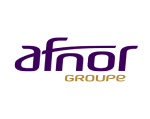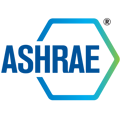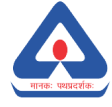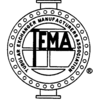
The American Concrete Institute (ACI, formerly National Association of Cement Users or NACU) is a non-profit technical society and standards developing organization. ACI was founded in 1904 and it is headquartered in Farmington Hills, Michigan, USA. ACI's mission is to “develop and disseminate consensus-based knowledge on concrete and its uses” in the form of standards, technical resources, and educational, training & certification programs. ACI has over 94 chapters, 244 student chapters, and 30,000 members spanning over 120 countries.

Association Française de Normalisation (AFNOR - French Standardization Association) is a Paris-based standards organization and a member body for France at the International Organization for Standardization (ISO).

The Automotive Industry Action Group (AIAG) is a not-for-profit association founded by three largest North American automotive manufacturers Ford, General Motors and Chrysler in 1982 and it’s based in Southfield, Michigan.

American Petroleum Institute(API) was formed in 1919 as a standards-setting organization and is the global leader in convening subject matter experts across segments to establish, maintain, and distribute consensus standards for the oil and natural gas industry. In its first 100 years, API has developed more than 800 standards to enhance operational safety, environmental protection and sustainability across the industry, especially through these standards being adopted globally.

The American Society of Heating, Refrigerating and Air-Conditioning Engineers is an American professional association seeking to advance heating, ventilation, air conditioning and refrigeration systems design and construction. ASHRAE has over 50,000 members in more than 130 countries worldwide.

ASM International, formerly known as the American Society for Metals, is an association of materials-centric engineers and scientists. Established in 1913, today ASM International is the world’s largest and most established materials information society, connecting you to a global network of peers and provides access to trusted materials information through reference content , data and research, education courses and international events; helping you to solve problems and improve materials related outcomes.

American Society of Mechanical Engineers (ASME), founded in 1880, is one of the oldest NOT-FOR-PROFIT standards-developing organizations in America.
ASME enables collaboration, knowledge sharing and skill development across all engineering disciplines, while promoting the vital role of the engineer in society and helps the global engineering community develop solutions to real world challenges. ASME codes and standards, publications, conferences, continuing education, and professional development programs provide a foundation for advancing technical knowledge and a safer world. ASME produces approximately 600 codes and standards covering many technical areas, such as boilers & pressure vessels, fasteners, plumbing fixtures, elevators, pipelines, and power plant systems and components.

The American Society for Nondestructive Testing, Inc. or ASNT is a technical society for nondestructive testing (NDT) professionals. ASNT evolved from The American Industrial Radium and X-ray Society which was founded in 1941 Its headquarters is located in Columbus, Ohio, and there are 70 local sections in the United States and 14 local sections in other countries.

ASTM International, formerly known as the American Society for Testing and Materials (ASTM), is a globally recognized leader in the development and delivery of international voluntary consensus standards for a wide range of materials, products, systems, and services.

The American Water Works Association is an international, nonprofit, scientific and educational society dedicated to providing total water solutions assuring the effective management of water. Founded in 1881, the Association is the largest organization of water supply professionals in the world.
AWWA's membership includes over 4,300 utilities that supply roughly 80 percent of the nation's drinking water and treat almost half of the nation’s wastewater. Our 51,000 total members represent the full spectrum of the water community: public water and wastewater systems, environmental advocates, scientists, academicians, and others who hold a genuine interest in water

Bureau of Indian Standards (BIS) is the National Standards body of India which has been successfully promoting and nurturing standards in the country since 1947. With over 500 qualified technical and scientific personnel and more than 25,000 experts voluntarily associated with standardization activities, BIS has formulated around 19,000 standards in various technological and industrial areas. Every year, more than 300 new standards and 300 amendments are published.
Indian Standards have been segmented into 14 Sections as per their Technical Divisions.

BSI, earlier known as British Standard Institution was the world’s first National Standards Body Formed in 1901 by Sir John Wolfe-Barry - the man who designed London’s Tower Bridge. BSI produces British Standards, and, as the UK's National Standards Body, is also responsible for the UK publication in English, of international and European standards. BSI is obliged to adopt and publish all European Standards as identical British Standards (prefixed BS EN). BSI also has the option to adopt and publish international standards (prefixed BS ISO or BS IEC).

CSA began as the Canadian Engineering Standards Association (CESA) in 1919, federally chartered to create standards.
For 100 years, CSA has remained an organization dedicated to safety, sustainability, and social good. From developing standards for aircraft parts, bridges, and wire rope in 1919, to enhancing standards with over 70,000 global members.

DIN Media founded in 1917, which represents the interests of German stakeholders worldwide. According to an agreement with the Federal Republic of Germany, DIN is recognized as the national standards body for Germany. Wherever standards are set in Germany, DIN is a unifying force.

Hydraulic Institute (HI), founded in 1917 is known as "The Global Authority on Pumps and Pump Systems". It is the largest association of pump industry manufacturers in North America. As the global authority on pumps and pump systems, HI develops industry standards through a vast array of technical resources including application guidebooks, online tools, and calculators.

The International Electrotechnical Commission (IEC), founded in 1906, is a not-for-profit organization that prepares and publishes international standards for all electrical, electronic and related technologies – collectively known as 'electrotechnology'. All IEC standards are fully consensus-based and represent the needs of key stakeholders of every nation participating in IEC work.

The Institute of Electrical and Electronics Engineers (IEEE, read I-Triple-E) is the world's largest professional organization dedicated to advancing technological innovation and excellence for the benefit of humanity. It is headquartered in New York and is a not-for-profit corporation. IEEE's roots go back to 1884 when electricity began to become a major influence in society. There was one major established electrical industry, the telegraph, which since the 1840s had come to connect the world with a data communications system faster than the speed of transportation. The telephone and electric power and light industries had just gotten underway.

Established on 23rd Feb 1947, The International Organization for Standardization (ISO), is an independent, non-governmental international standards development organization having representatives from various national standards organizations of member countries. ISO is a network of 167 member countries, with a Central Secretariat in Geneva, Switzerland that coordinates the system.
ISO has published 24, 676 International Standards covering all technical & non-technical fields other than electrical & electronic engineering which are the responsibility of IEC.
It could be about making a product, managing a process, delivering a service or supplying materials – ISO standards cover a huge range of activities.

The Japanese Standards Association (JSA), is a national standards body of Japan responsible for development & promotion of standards. The objective of the association is “to educate the public regarding the standardization and unification of industrial standards, and thereby to contribute to the improvement of technology and the enhancement of production efficiency”.

The National Board of Boiler and Pressure Vessel Inspectors (NBBI) established in 1919 is the worldwide leader in pressure equipment safety.
It promotes greater safety to life and property through uniformity in the construction, installation, repair, maintenance, and inspection of pressure equipment.
The NBBI is composed of chief boiler and pressure vessel inspectors representing states, cities, and provinces enforcing pressure equipment laws and regulations. Created to prevent death, injury and destruction, these laws and regulations represent the collective input of National Board members. As an outcome, NBBI published the National Board of Boiler and Pressure Vessel Inspectors Codebook, popularly known as the NBIC (National Boiler Inspection Code) that consists vital information about installations, inspections and repairs & alterations of boiler and pressure vessels.

The National Electrical Manufacturers Association is the largest trade association of electrical equipment manufacturers in the United States. Founded in 1926, it advocates for the industry and publishes standards for electrical products.

SAE International, formerly named the Society of Automotive Engineers, is a United States-based, globally active professional association and standards developing organization for engineering professionals in various industries. SAE is a global association of more than 128,000 engineers and related technical experts and its principal emphasis is placed on global transport industries such as aerospace, automotive, and commercial vehicles.
SAE International has published more than 226,000 industry-leading technical papers, standards, reports, books, magazines, and other content.

The Tubular Exchanger Manufacturers Association (also known as TEMA) is an association of fabricators of shell and tube type heat exchangers.[1] TEMA has established and maintains a set of construction standards for heat exchangers, known as the TEMA Standard.[2] TEMA also produces software for evaluation of flow-induced vibration and of flexible shell elements (expansion joints). TEMA was founded in 1939, and is based in Tarrytown, New York.[3] The association meets regularly to revise and update the standards, respond to inquiries, and discuss topics related to the industry.

UL Standards & Engagement, commonly known as “Underwriters Laboratories” is the organization responsible for standards development under UL, represent the very best in scientific methodology and testing expertise, combined with invaluable input from experts and stakeholders — from industry to academia, regulatory to retail, manufacturers to end-users — via UL Standards & Engagement's consensus-based standards development process. Ultimately, UL Standards & Engagement Standards function as a benchmark that enables consumers, businesses, and regulators to feel confident about the products and services they purchase.
UL Standards & Engagement translates scientific discoveries into standards and policies that have the power to make a systemic impact on public safety throughout the world.
Distinguished by our independent research and informed foresight, UL has been translating cutting-edge science into practical standards since 1903. Their extensive library of standards helps to make everyday things safer, more secure, and more sustainable, from life jackets to batteries to autonomous cars.
Expand Your Knowledge and Unlock Your Learning Potential - Your One-Stop Source for Information!
© Copyright 2024 BSB Edge Private Limited.